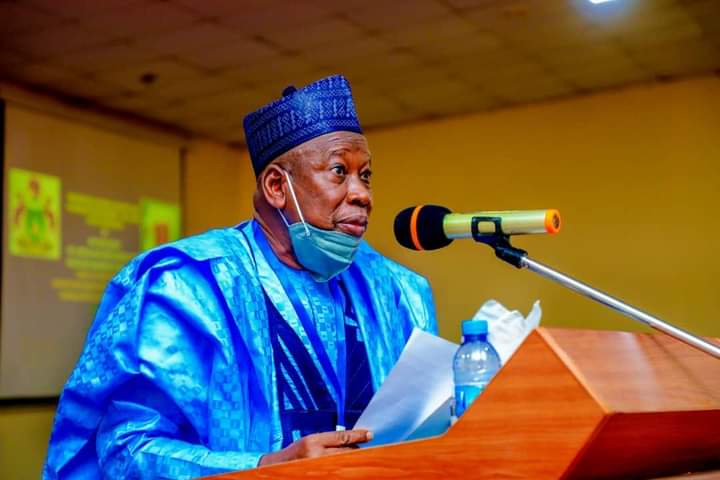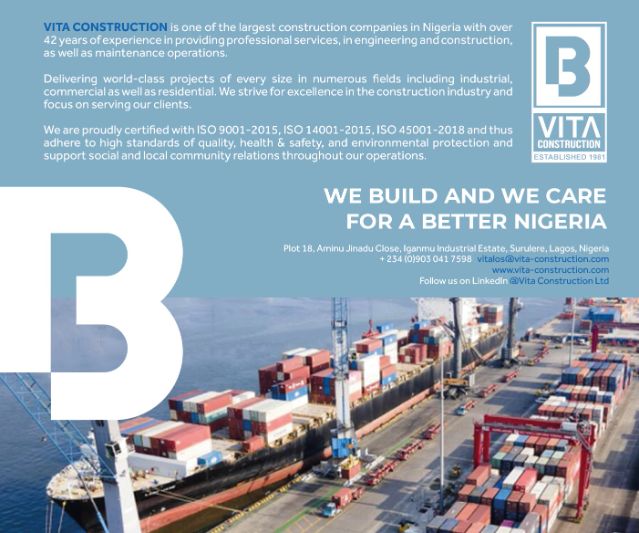The expression, ‘the North is organising while the South is agonising’ is quite common on this page whenever the preparedness and organisational capability of the North for political power is in focus. The comparative analysis isn’t meant to disparage any efforts while deconstructing power relations and ‘dynamic capabilities’ in the complex federation that Nigeria has become.
It is just to stimulate discussions that can lead to deepening understanding of some reasons the North will always defeat the South when it comes to national planning and even elections. This road note is just a touch-light to even how the North may also do well in the next elections we are anxious for through their consistency in strategic planning and commitment to the region as a fundamental objective. One of the critical success factors of their political engagements is the grit of most of their frontline leaders and thinkers.
One of them is the outgoing Governor of Kano State, Abdullahi Umar Ganduje, (PhD) who is curiously not a candidate for any elective positions in this season’s general elections. The Governor appears harmlessly simple, unassuming and humble when you meet him. You are likely to dismiss him as a naïve former civil servant who is now a gentle political leader. He isn’t as simple and naïve as you would want to characterise him. He will appear to you as a shrewd political thinker and very artful in execution – the discipline of getting things done. Ganduje is at the moment quite busy in the field of harnessing politics-and-policy resources to prepare the North for the next dispensation of leadership in Nigeria. He isn’t contesting elections but he is busier than most contestants on the campaign fields. He appears to be the most ardent and loyal follower and planner in the campaign council of one of the major presidential candidates who hails from the South. If his preferred candidate wins, Ganduje, a quiet operator, will certainly be on the high table of value allocations for the North. He has cast enough bread on the waters and so will find it the morning after (victory). What is more, he isn’t part of those casting aspersions on the two other main presidential candidates (including his former principal in Kano) from the North.
He began this strategic journey shortly after he was elected for a second term in 2019 when he launched the free and compulsory basic and secondary education policy with fanfare amidst concern for the impact of campaign by a terror group against western education in parts of northern region. That campaign for free and compulsory education was hailed then by a major newspaper editorial “as a remarkable lesson that all states in the North should embrace immediately”.
Vice President, Professor Yemi Osinbajo, was among top officials, educationists, scholars and political leaders who attended a two-day summit used as the launch pad. Development partners including DFID, USAID, UNESCO and top diplomats from United States, United Kingdom, UAE, Egypt, Saudi Arabia, among others witnessed the event in Kano city.
At the ceremony, Ganduje noted that, the objective of the summit, which heralded the policy was “to discuss, analyse and generate ideas towards the implementation of our vision for free and compulsory basic and secondary education.” The governor also noted then that his commitment to the policy was borne out of a promise he made on assumption of office for the second term on May 29, 2019, “to provide free and compulsory education from Primary to Senior Secondary School level.’’
Another newspaper editorial noted then too: “It is gratifying to note that the governor of the commercial capital of the North and the Nigeria’s most populous state recognises the pivotal role of education as the primary agent of change in our society”.
The huge turnout by diplomats and other development partners clearly indicated then that the government of Kano State is not alone in the crusade to address a specific fundamental challenge of our society – fighting millions of out-of-school children (OOSC).
At that time (2019) it was disturbing to note from available statistics that Nigeria had over 10.5 million out-of-school children. But it was more alarming to note then that 60% of that figure represented the girl-child. Also eight million of those out-of-school children were at the time in 10 northern states of Nigeria with Kano having the lion’s share. Specifically, available figures indicated that over three million of these out of school children were in Kano at that time.
Besides, a survey then had revealed that most of these children were Almajiri from other northern states and children from the Republic of Niger, Chad and Northern part of Cameroun. And so, to ensure sustainability in the integration of the Almajiri system of education, there was the need for regional coordination and legislation to control the movement of Almajiris from one state to another. Governor Ganduje had then noted the expediency of inter-state co-operation and control of migration in his address to participants of the two-day free-education event.
Intrinsically linked to the policy then was the issue of Quar’anic and Islamiyya schools for which statistics had indicated that there were 13,619 of these schools with over 2.5 million pupils. In order to streamline these schools and integrate them into the free and compulsory education programme, Kano State Government had then set up Qur’anic and Islamiyyah Schools Management Board to avoid ad-hocism that dots our policy environment, discipline of execution has become a huge challenge.
The same Ganduje is on the march again. While others are making noise and dispensing public relations tragedy for their main candidates, the Governor of Kano State has set off another remarkable move in the realm of conflict management in agriculture business and socio-cultural relations. The destruction of farmlands have often led to clashes between farmers and herders across the country.
Barely a month ago, the Governor inaugurated a Committee tasked with planning a national conference to proffer solutions to farmer-herder clashes in the country. The 26-member Committee was headed by a very significant figure, Professor Attahiru Jega, former Vice Chancellor, Bayero University, Kano, former Chairman of Independent National Electoral Commission (INEC).
In his opening remark at the inauguration of the committee, Ganduje said “the national livestock transformation plan (NLTP) proposed by the federal government to tackle the problem has not yielded results because of “inadequate political leadership”. The Governor added: “It is gladdening, therefore, to say that since assumption of office in 2015, we in Kanohave led the way and have been pioneering the initiation of development-oriented interventions at reformation of the livestock sector to mitigate farmer-herder conflicts by tackling the issue headlong…Your selection to serve as members of this committee is solely based on your experiences and contributions to national development in your respective fields…It is our hope that you will work towards planning and organising a befitting national conference on farmer-herder conflicts in Nigeria and to select an appropriate theme for the conference. The organising committee is also to draft a blueprint for reform of traditional livestock/cattle rearing and mitigation of associated conflicts in Nigeria, and to undertake any other activities towards the successful planning and organising of the conference in accordance with the terms of reference as specified”.
The well-attended Conference was held on Monday 13 and Tuesday 14, February 2023 (last week) in Abuja. There was one remarkable feature of the Conference: the Governor and the Deputy Governor didn’t leave after the opening ceremony attended by the Vice President, Professor Yemi Osinbajo, Sultan of Sokoto, several Emirs, diplomats and sundry scientists and scholars of various hues. They listened to all the technical sessions for two days until the Communique of the Conference was read and adopted.
Specifically, the two-day conference on “Livestock Reforms and Mitigation of Associated Conflicts” brought together scholars, professionals, captains of industry and practitioners in the field of agricultural development, value chain specialists and researchers in diverse fields of animal production. The National Conference recommended, among others the establishment of the Ministry of Livestock Resources. In a communique issued at the end of the two days National Conference, it was agreed that the call was in tandem with practices in many other West African countries. The communique signed by Prof Attahiru Jega, said in the alternative, federal and state governments should expand the scope of existing Departments of Livestock Production to address the broader needs of the industry. Similarly, the Conference further stressed the need for the creation of additional research institutions for beef, dairy and pasture production as a strategy for expanding funding and enacting policies and programmes for the development of the sector at all levels of government. The communiqué calls on media organisations to create awareness at all levels that will promote Inclusive communities, strengthen harmonious relations to encourage government and private sector investments for cohesive societies and improved productivity. The document also enjoins the news media to note that profiling and reportage that malign socio-economic and ethnic groups need to be avoided.
The participants call on the United Nations (UN) Agencies, Bilateral institutions, regional organizations (AU and ECOWAS), national and international CSOs and other support organisations to increase the level of funding and support to the government of Nigeria in mitigating the Impact of climate change, addressing technology gaps, addressing poverty and skills gap and improving people’s livelihoods. They further stressed the need to support agricultural and pastoralists organisations, cooperative societies and relevant producer associations and professional bodies for improved productivity.
Among the resolutions of the experts that include specialists in range management, veterinary services, economics, history, cultural studies, climate change, natural resources management, governance and conflict management, among others was the need to revisit and review sub-national, national and regional laws, legislations and policies to make applicable reforms for improving Livestock production and addressing conflicts. It includes the need to adopt Climate Smart Agricultural (CSA) practices, including the adoption of Integrated approach to managing landscapes of croplands, rangelands, forests and fisheries that address the Interlinks between the quest for food security and mitigation of the challenges of climate change. They also harped on the need to strengthen and Improve the security architecture for the prevention of violent crimes including cattle rustling, raiding of villages, kidnapping of persons for ransom and trade in illicit arms and drugs.Continuing, they noted: “There is the need to strengthen the process of litigation for more effective dispensation of justice and handling of the various litigations relating to violent crimes and other perpetrators of violent conflicts. “There is the need to reform the security and judicial architectures to ensure the curtailing of farmer-herder conflicts, cattle rustlng, illegal arms trade, importation and proliferation in the country”. In the same vein, they urged ”political leaders at all levels to refrain from politicising the issue of farmer-herder conflicts and other associated issues while pursuing inclusive processes that will strengthen unity and cooperation in the country.”
The participants commended the Kano State Government under the leadership of Governor, Dr. Abdullahi Umar Ganduje, for Initiating and sponsoring the National Conference, which demonstrates his patriotism and strong commitment toward enhancing peaceful co-existence, unity and development in the country. While appreciating the Kano state government for the Conference, the participants urged Governor Ganduje to use his good offices and Influence to present the resolutions and proceedings of this National Conference before the National Council of State and the Nigeria Governors Forum (NGF).
This is another masterstroke by the very artful Ganduje who has thus urged the Conference Committee to prepare a Blueprint for solution to one of the problems that may greet new leaders that will emerge from the elections of February 25 and March 11, 2023. Who among the political leaders in the southern part of the country is technically ready with a Blueprint for solution to some of the challenges plaguing the south and indeed the country in a strategic manner this way?











